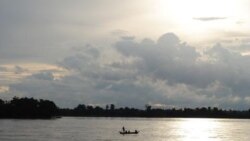The nations of Southeast Asia’s Mekong River Basin are increasingly turning to hydropower to answer their growing energy and development needs. Ironically, damming the Mekong may pose both immediate and long-term threats to tens of millions downstream who depend on it for food security and their livelihoods.
Nearly 70 million people in the Mekong basin rely heavily on the river, and those involved in irrigated agriculture and fishing make up 85 percent of the workforce there. On a visit this summer, U.S. Secretary of State Hillary Clinton called the river a “miracle” and the most productive such system in the world.
The Lower Mekong River runs freely from China to the sea. The Lao government announced it is building the lower river’s first hydroelectric dam at Xayaburi, sparking concerns on the impact that development could have on this dynamic river system. The United States hopes that the Government of Laos will uphold its pledge to work with its neighbors to address these concerns, and encourages all parties to work together to realize their shared vision for an economically prosperous, socially just and environmentally sound Mekong River basin.
We recognize the important role that dams can play in managing water resources, promoting economic growth and producing renewable energy. At the same time, our own experience here in the U.S. has made us aware of the economic, social and environmental impacts such projects can have over time. The extent and severity of the impacts from the Xayaburi dam on an ecosystem that provides food security and livelihoods for millions are still unknown.
The United States is working to build capacity within the region and to encourage the countries along the Mekong River to work together to better understand and to cooperatively develop these resources for the benefit of all stakeholders. Institutions like the Mekong River Commission can play an important role by ensuring decision makers have access to the best technical and scientific knowledge available. We will continue to work to create a stronger Mekong River Commission that serves all the people of the region. Our ultimate goal is to support the countries of the region as they work to provide their people with a better future. Working together, it will be possible to realize this shared vision for the region: an economically prosperous, socially just and environmentally sound Mekong River basin.
Nearly 70 million people in the Mekong basin rely heavily on the river, and those involved in irrigated agriculture and fishing make up 85 percent of the workforce there. On a visit this summer, U.S. Secretary of State Hillary Clinton called the river a “miracle” and the most productive such system in the world.
The Lower Mekong River runs freely from China to the sea. The Lao government announced it is building the lower river’s first hydroelectric dam at Xayaburi, sparking concerns on the impact that development could have on this dynamic river system. The United States hopes that the Government of Laos will uphold its pledge to work with its neighbors to address these concerns, and encourages all parties to work together to realize their shared vision for an economically prosperous, socially just and environmentally sound Mekong River basin.
We recognize the important role that dams can play in managing water resources, promoting economic growth and producing renewable energy. At the same time, our own experience here in the U.S. has made us aware of the economic, social and environmental impacts such projects can have over time. The extent and severity of the impacts from the Xayaburi dam on an ecosystem that provides food security and livelihoods for millions are still unknown.
The United States is working to build capacity within the region and to encourage the countries along the Mekong River to work together to better understand and to cooperatively develop these resources for the benefit of all stakeholders. Institutions like the Mekong River Commission can play an important role by ensuring decision makers have access to the best technical and scientific knowledge available. We will continue to work to create a stronger Mekong River Commission that serves all the people of the region. Our ultimate goal is to support the countries of the region as they work to provide their people with a better future. Working together, it will be possible to realize this shared vision for the region: an economically prosperous, socially just and environmentally sound Mekong River basin.






